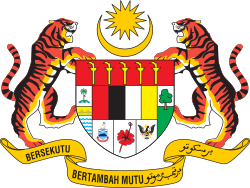Parti Gerakan Rakyat Malaysia | |
|---|---|
 | |
| English name | Malaysian People's Movement Party |
| Abbreviation | PGRM/GERAKAN |
| President | Dominic Lau Hoe Chai |
| Secretary-General | Wong Chia Zhen |
| Deputy President | Oh Tong Keong |
| Vice President | Koo Shiaw Lee Baljit Singh Jigiri Singh Alexander Lo Su Hyen Ranndy Yap Kim Heng Parameswaran Ganason Chek Kwong Weng Gary Lee Ban Fatt |
| Women Chief | Chung Mon Sie |
| Youth Chief | Wong Chia Zhen |
| Founder | Syed Hussein Alatas Tan Chee Khoon J.B.A. Peter Lim Chong Eu Veerappen Veerathan Wang Gungwu |
| Founded | 24 March 1968 |
| Registered | 22 May 1968 Officially registered |
| Legalised | 28 May 1968 Legalised as 'political party' by Registrar Of Societies |
| Split from | • Malaysian Chinese Association (MCA) • United Democratic Party (UDP) • Labour Party of Malaya (LPM) |
| Preceded by | United Democratic Party Labour Party (partial) |
| Headquarters | 8, Jalan Pudu Ulu, Cheras, 56100 Kuala Lumpur, Malaysia |
| Newspaper | GERAKAN Today (e-periodical) |
| Think tank | Socio-Economic Development And Research Institute (SEDAR) |
| Youth wing | PEMUDA |
| Women's wing | WANITA |
| Membership (2022) | 285,100 |
| Ideology | Multiracialism |
| Political position | Syncretic |
| National affiliation | Barisan Nasional (1973–2018) Perikatan Nasional (2021–) Ikatan Prihatin Rakyat (since 2025) |
| International affiliation | Liberal International (observer) [1] Alliance of Democrats |
| Regional affiliation | Council of Asian Liberals and Democrats |
| Colours | Red & Green |
| Slogan | Satu Hati Gerak Bersama (Forward Together with One Heart) |
| Anthem | Satu Hati |
| Dewan Negara: | 0 / 70 |
| Dewan Rakyat: | 0 / 222 |
| Dewan Undangan Negeri: | 1 / 611 |
| Election symbol | |
 | |
| Party flag | |
 | |
| Website | |
| www | |
 |
|---|
| Part of a series on |
| Liberalism |
|---|
 |
The Parti Gerakan Rakyat Malaysia (English: Malaysian People's Movement Party; abbrev: GERAKAN or less commonly as PGRM) is a liberal political party in Malaysia. Formed in 1968, Gerakan gained prominence in the 1969 general election when it defeated the ruling Alliance Party in Penang and won the majority of seats in Penang's state legislature. However, in 1972, Gerakan joined the Alliance Party, which later evolved into Barisan Nasional (BN) and contested the 1974 general election and subsequent elections as part of the ruling coalition. The party maintained representation in the Dewan Rakyat until the 2018 general election, when it lost all its seats amid BN's historic defeat. Gerakan subsequently left BN and has been a member of Perikatan Nasional (PN) since 2021.
Contents
- History
- Formation
- 1969–2007
- 2008–2017
- 2018–present
- Elected representatives
- Senators
- Dewan Undangan Negeri (State Legislative Assembly)
- Leadership
- Government offices
- State governments
- List of party leaders (Presidents)
- General election results
- State election results
- References
- Notes
- External links
Gerakan also held a dominant position in the Penang State Legislative Assembly from 1969 to 2008 and also achieved some success nationally as part of the ruling BN coalition, particularly in the 2004 general election. However, its fortunes declined sharply in the 2008 election, and left the coalition following BN's defeat in the 2018 general election. [2] While it joined PN in 2021, [3] it had no representation at the national or state-level until the 2023 Kedah state election, where the party achieved its first electoral victory since 2014. Despite clashes with its coalition allies, the party is perceived to be dependent on continued membership within PN. [4]
The party is assisted by an affiliated think tank called SEDAR Institute (Socio-Economic Development And Research Institute). The party is a member of the Council of Asian Liberals and Democrats. At its height, the party's primary source of support came from the country's ethnic Chinese who constitute 80% of the party's membership, with 15% being ethnic Indian and the remaining spread between the Malays and other groups. [5]